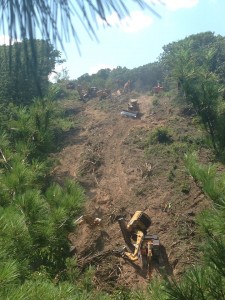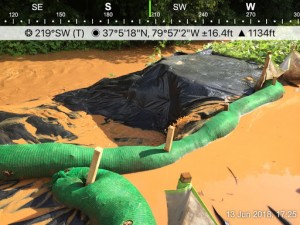Commentary by Chris Hurst, VA House of Delegates, Roanoke Times, February 17, 2020
(Delegate Chris Hurst represents Giles County, Radford and parts of Montgomery and Pulaski counties in the House of Delegates. He is a Democrat.)
Sediment steadily encroaching onto private property. Road closures and traffic jams. Man-made erosion of the lush Appalachian Mountains. This has become the new normal for the residents of my district and far too many others who live in Southwest Virginia.
The unfortunate truth is that this is what so many of us warned about when the Mountain Valley Pipeline Project filed for its construction permit in 2015. Now, almost five years later, following dubious arguments and deceitful reassurances from big energy and stakeholders of the MVP, the commonwealth’s environment and its citizens are more at risk to the consequences of this project than ever before.
In 2018, the MVP racked up more than 300 permit violations for carelessly violating Virginia’s water quality standards, failing to repair broken equipment, allowing man-made erosion to occur, poor stormwater management, and more. These violations averaged more than one per day during construction and were unquestionably significant. The commonwealth clearly understands the crisis that these violations bring, as made evident by the Office of the Attorney General’s decision to sue the MVP alongside the Department of Environmental Quality over the high number of violations in late 2018.
While I’m proud of the work the Attorney General has done to hold the Mountain Valley Pipeline accountable, Virginia is not doing nearly enough to defend our environment from the threats we face.
As I stated in the Agriculture Chesapeake and Natural Resources’ Subcommittee on Natural Resources last Wednesday morning, we have not seen any substantive change of heart, change of action, change of principle, or change of practice to make sure that pipeline projects are done in a safe and reliable manner. A lack of guidelines and legislation within the commonwealth have allowed these violations to continue to occur at an unsustainable rate.
The legislation I have proposed will put an end to these problems
House Bills 643, 644, and 646 will safeguard our citizens and environment while holding the MVP accountable for its negligent practices. These three bills, that all passed out of the Agriculture Chesapeake and Natural Resources Committee on Wednesday, work in tandem to ensure that pipeline projects under construction in the commonwealth strictly comply with safety regulations to the fullest extent of the law. This will be accomplished by allowing the State Water Control Board to pursue more aggressive action when violations occur.
Collectively, my bills increase safety thresholds for pipeline projects and authorize the Department of Environmental Quality and the State Water Control Board to issue stop work orders should those thresholds be violated, direct the State Water Control Board to adopt more severe penalties for water quality violations by any pipeline construction project, and increase the legal penalty and/or fine for violating pipeline permitting regulations. In codifying these bills into law, we can protect our environment, landowners’ property, and my constituents, as well as many more inhabitants of Southwest Virginia.
These bills send a message to Virginians that we place their health and safety above the corporate greed, careless practices, and broken promises of pipeline projects and their stakeholders. They are a crucial step in the right direction, however we face an uphill battle ahead of us.
With the Mountain Valley Pipeline Southgate Expansion and Atlantic Coast Pipeline projects looming, it is the paramount responsibility of our legislature to ensure every Virginian is protected from the threats these projects pose both currently and in the future.
We spoke out when it was proposed that a pipeline containing more pressure than beneath the ocean floor would run through our towns and backyards, and nothing happened. We warned of the dangers of constructing a 42 inch diameter pipeline through karst mountain topography, and companies ensured us we were safe. The residents of Montgomery, Giles, Franklin, Pittsylvania, and Roanoke Counties made it very clear that no pipeline project was welcome in their communities, and eminent domain was used to ram it down their throats anyway. When 12th District residents saw brown streams of sediment being deposited into their backyards and their roads closed due to man-made erosion, the Mountain Valley Pipeline got a slap on the wrist.
The time for the commonwealth to enact legislation that safeguards public safety and our environment is now. Although projects like the Mountain Valley Pipeline are slated to be completed, there are simple measures we can take in this moment to ensure companies both in the present and future are held accountable for their negligence. Our great commonwealth sits at the precipice of an emergency, and I implore my colleagues to take a stand with me during the remainder of our session.
>>>>>>>>>>>>>>>>>>>>>>>>>>>>
See also: Virginia Tech professor seeks to change Mountain Valley Pipeline agenda | Virginia Tech Collegiate Times, January 30, 2020
Virginia Tech Appalachian studies professor Emily Satterwhite chained herself to a site excavator in protest against Mountain Valley Pipeline construction June 28, 2018, to bring attention to the Appalachian community.
“I have always admired the people who have stood up to power (against) corporations,” Satterwhite said. “When the fossil fuel industry announced an expansion into the county — where I live in Appalachia — I knew immediately that it was something I would have to take a stand against.”
At dawn, Satterwhite ascended into the morning air on top of Brush Mountain. A 30-foot construction excavator, which was owned by the Mountain Valley Pipeline, became the subject of Satterwhite’s protest where she demonstrated opposition to the project’s presence in Southwest Virginia. Determined to protect her Appalachian community, Satterwhite climbed the imposing structure to act as a physical barrier and delay construction. Satterwhite bound herself to the excavator’s hydraulic piston through a steel lockbox, known as a sleeping dragon, securing her forearms to the structure.


